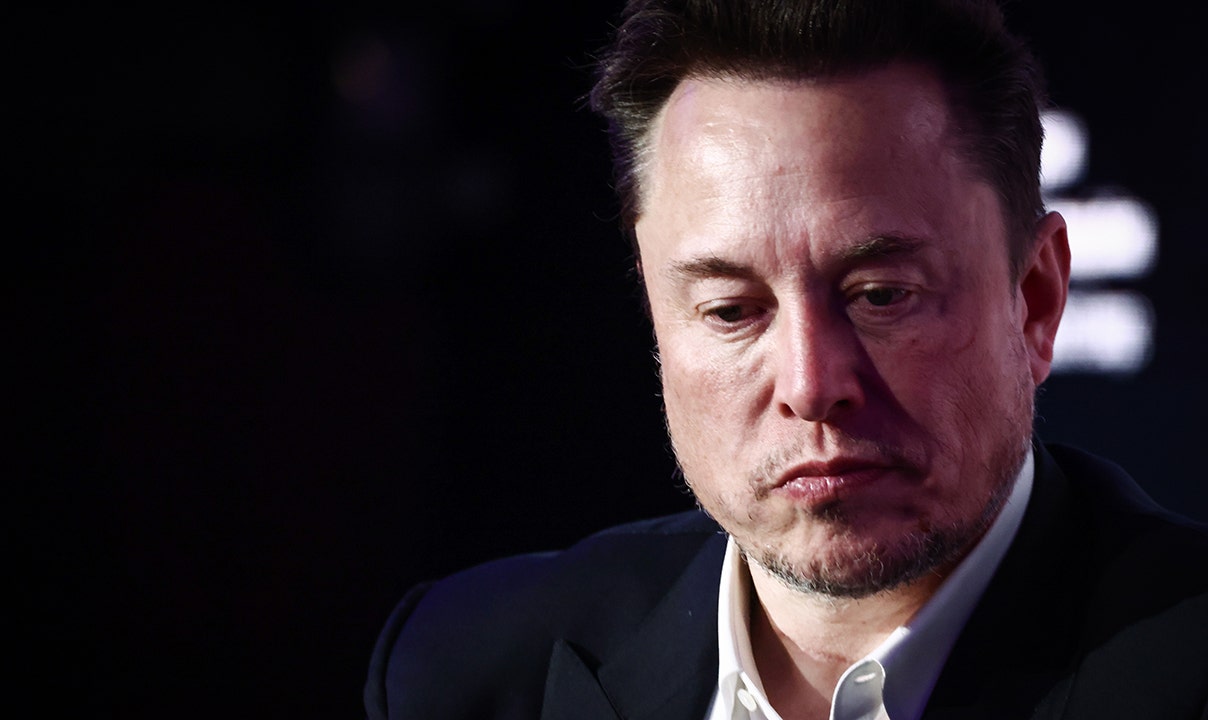Is Elon Musk The Antichrist? Separating Fact From Fiction
Elon Musk has been a polarizing figure in recent years, sparking debates not just about his business ventures but also about his influence on global events. The question "Is Elon Musk the Antichrist?" might seem absurd to some, but it has gained traction in certain circles, blending religion, conspiracy theories, and pop culture into one heated discussion. Let's dive deep into this topic and explore the facts, myths, and everything in between.
It’s no secret that Elon Musk is one of the most talked-about individuals in the world today. From founding SpaceX and Tesla to buying Twitter, he has consistently pushed boundaries and challenged norms. However, with great power comes great speculation, and for many, the idea of Musk being linked to biblical prophecies or apocalyptic scenarios feels almost inevitable. Is there any truth to these claims? Let’s find out.
This article aims to provide a balanced perspective, separating fact from fiction while addressing the concerns and curiosities surrounding Elon Musk's public persona. Whether you're here out of genuine concern or just curiosity, we’ll break down the key points, explore the evidence, and offer some food for thought. So buckle up, because this ride is going to be wild!
Read also:Unlock The Power Of Iot Ssh From Anywhere Free On Windows 10
Table of Contents
- Elon Musk: A Quick Biography
- What Does It Mean to Be the Antichrist?
- Evidence Supporting the Theory
- Refuting the Claims
- Biblical Perspective on the Antichrist
- Conspiracy Theories Surrounding Elon Musk
- Elon Musk's Global Influence
- Public Opinion and Social Media Buzz
- Reality Check: Is Elon Musk Really That Powerful?
- Conclusion: What Do You Believe?
Elon Musk: A Quick Biography
Early Life and Career
Born on June 28, 1971, in Pretoria, South Africa, Elon Musk showed early signs of brilliance. He taught himself computer programming at the age of 12 and sold his first video game, Blastar, for $500. After moving to Canada and then the United States, Musk co-founded Zip2, a web software company that was eventually acquired by Compaq for $307 million.
His entrepreneurial spirit didn’t stop there. Musk went on to co-found PayPal, revolutionizing online payments, before venturing into space exploration with SpaceX and electric vehicles with Tesla. His ambitious projects, such as Neuralink, The Boring Company, and Starlink, have positioned him as a pioneer in multiple industries.
Key Achievements
Here’s a quick rundown of some of Musk’s most notable achievements:
- Co-founder of PayPal, which became a household name in digital transactions.
- Founder of SpaceX, the first private company to send humans to the International Space Station.
- Cofounder of Tesla, leading the charge in sustainable energy and electric vehicles.
- Advocate for artificial intelligence research through OpenAI.
Despite his successes, Musk’s life hasn’t been without controversy. His bold statements, erratic behavior, and controversial decisions have often put him in the spotlight – sometimes for the wrong reasons.
What Does It Mean to Be the Antichrist?
The concept of the Antichrist originates from Christian theology and is mentioned in several books of the Bible, including the New Testament. Traditionally, the Antichrist is seen as a false messiah who deceives people and leads them away from God. While interpretations vary among different denominations, the idea generally revolves around someone who appears charismatic and influential but ultimately causes harm to humanity.
Over the years, various historical figures have been labeled as potential Antichrists, including Adolf Hitler, Napoleon Bonaparte, and even modern-day leaders. The rise of technology and globalization has added new layers to these theories, with some believing that advancements like artificial intelligence and biotechnology could play a role in fulfilling biblical prophecies.
Read also:Real Carly Jane The Ultimate Guide To Her Life Career And Influence
Evidence Supporting the Theory
Elon Musk's Controversial Statements
One of the reasons why Musk is often associated with the Antichrist narrative is his outspoken nature. He has made several controversial statements over the years, ranging from jokes about world domination to serious discussions about the dangers of artificial intelligence. For instance, Musk once said, "With artificial intelligence, we are summoning the demon," a statement that some interpret as ominous.
His Influence on Technology
Musk’s companies are at the forefront of technological innovation. SpaceX aims to colonize Mars, Neuralink seeks to merge human brains with computers, and Starlink plans to provide global internet coverage. While these projects hold immense promise, they also raise ethical concerns about privacy, surveillance, and control. Some critics argue that Musk’s vision for the future could lead to a dystopian reality where technology dominates humanity.
Cultural Symbolism
Pop culture plays a significant role in shaping public perception. Elon Musk’s larger-than-life persona, combined with his involvement in futuristic technologies, makes him an easy target for conspiracy theories. In a world where sci-fi movies and dystopian novels dominate the entertainment industry, it’s not surprising that people draw parallels between Musk’s ambitions and apocalyptic scenarios.
Refuting the Claims
Misinterpretation of Biblical Texts
While the Antichrist theory might sound convincing to some, it’s important to remember that biblical texts are open to interpretation. Many theologians argue that the concept of the Antichrist is symbolic rather than literal, representing systems of oppression and injustice rather than a single individual.
Elon Musk's Public Stance
Contrary to the claims, Musk has consistently emphasized the importance of ethical considerations in his work. He advocates for sustainable energy, warns against the misuse of AI, and encourages transparency in business practices. If anything, Musk’s actions suggest a commitment to improving the world, not destroying it.
Human Fallibility
It’s also worth noting that Elon Musk is far from perfect. Like any other human being, he makes mistakes and faces criticism. Labeling him as the Antichrist oversimplifies complex issues and ignores the broader context of his contributions to society.
Biblical Perspective on the Antichrist
To understand the Antichrist theory fully, it’s essential to examine its biblical roots. The term “Antichrist” appears in 1 John 2:18, where the apostle John warns believers about false prophets and deceivers. Later passages describe the Antichrist as someone who will perform miracles, deceive many, and ultimately reveal their true nature.
Some scholars believe that the Antichrist represents a collective force rather than a single person. This perspective emphasizes the importance of resisting systemic evil and standing up for justice, regardless of who or what is causing harm.
Conspiracy Theories Surrounding Elon Musk
Deep State Connections
One popular conspiracy theory suggests that Musk is part of a secret cabal controlling global affairs. Proponents of this theory point to his close ties with powerful institutions and his ability to secure government contracts. However, there’s little evidence to support these claims beyond circumstantial speculation.
Mind Control and AI
Another theory revolves around Musk’s work with Neuralink, which aims to develop brain-computer interfaces. Critics argue that this technology could be used for mind control or surveillance, giving Musk unprecedented power over humanity. Again, while the concerns are valid, they lack concrete evidence and fail to consider the potential benefits of such innovations.
Global Domination
Finally, there’s the idea that Musk is working towards world domination through his various ventures. While he certainly has ambitious goals, it’s important to remember that his companies operate within legal frameworks and face competition from other players in the market. Claiming that Musk seeks global domination ignores the complexities of modern business and politics.
Elon Musk's Global Influence
There’s no denying that Elon Musk is one of the most influential people in the world today. His companies have disrupted traditional industries, inspired countless innovators, and changed the way we think about the future. However, influence doesn’t automatically equate to malicious intent. Musk’s impact can be seen as both positive and negative, depending on one’s perspective.
For example, Tesla’s success has accelerated the adoption of electric vehicles, reducing carbon emissions and promoting sustainability. Similarly, SpaceX’s achievements have renewed interest in space exploration and opened up possibilities for interplanetary travel. On the flip side, critics argue that Musk’s aggressive business tactics and disregard for regulations have caused harm to workers and communities.
Public Opinion and Social Media Buzz
Social media has played a significant role in amplifying the Antichrist theory. Platforms like Twitter and Reddit are filled with discussions, memes, and debates about Musk’s supposed role in biblical prophecies. While some users take the theory seriously, others see it as a joke or a way to engage in playful banter.
Public opinion on Musk is divided. Some view him as a visionary leader who’s changing the world for the better, while others see him as a reckless billionaire who prioritizes profit over people. Regardless of where you stand, it’s clear that Musk’s influence extends beyond his business ventures and into the realm of cultural discourse.
Reality Check: Is Elon Musk Really That Powerful?
While Elon Musk is undoubtedly influential, it’s important to keep things in perspective. He doesn’t have unlimited power, nor does he control every aspect of global affairs. His companies face numerous challenges, including regulatory hurdles, financial constraints, and competition from rivals.
Moreover, Musk’s decisions are often influenced by external factors such as public opinion, market trends, and political pressures. Claiming that he’s the Antichrist ignores the complexities of modern life and reduces a multifaceted individual to a one-dimensional stereotype.
Conclusion: What Do You Believe?
So, is Elon Musk the Antichrist? The answer depends on how you interpret the evidence and what you believe. While some aspects of Musk’s life and work might align with certain prophecies, it’s crucial to approach the topic with a critical mindset and avoid jumping to conclusions based on speculation alone.
Instead of focusing on labels, perhaps we should concentrate on the issues that truly matter: How can we harness technology for the greater good? How can we address ethical concerns surrounding AI and biotechnology? And how can we ensure that progress benefits everyone, not just a select few?
As always, the choice is yours. Feel free to share your thoughts in the comments below, and don’t forget to check out our other articles for more insights and analysis. Until next time, stay curious and keep questioning!


